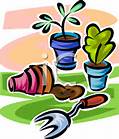The key to success is to think of food chains. Wild things will not come to your garden if you do not have food for them. Welcome visitors such as robins, tits, wrens and hedgehogs feed on insects and other invertebrates so it makes no sense to wage war on these creepy crawlies.
The greater the variety of creatures that visit the garden the more likely they are to balance each other out and the plague of nasties will not decimate the plants.
Here are a few ideas for a wild life friendly garden.
Bird box in a sheltered site, out of reach of predators (clean it every year to get rid of mites). Put out protein rich food and a variety of seed for different species. The feeder if possible should be near a dense shrub so that small birds can dart in and out to feed, safe from cats.
Ivy and Climbers. The flowers and seeds of ivy are nutritious and are a good source of pollen. Ivy being evergreen provides a protective habitat all year round.
Clematis and rose all create good habitats at varying heights and attract bees and birds to feed.
Water source. All creatures need fresh, unchlorinated water. Build a pond, bury a shallow bucket. Read a good gardening book for ideas to suit your garden.
Compost Bins use up waste and also feed the soil. They are also a habitat for worms, woodlice, fungi, frogs grass snakes and spiders supplying a cordon bleu feast for garden visitors. Read up more on composting.
Flowers. Grow as many flowers as you can from spring bulbs to late flowering perennials. Choose flowers that are true to species not bred by humans for lots of petals. Petals grow at the expense of pollen and nectar and make it harder for bees to get inside. Examples include foxgloves, marigolds and cornflowers. There are many more pollinator friendly flowers to read up about.
Weeds. Dare I mention that they are some of the best plants for pollinators. Buttercups, daisies and wild foxgloves flower for a long time and thrive in bad growing conditions. Do not be too tidy behind a shed. Out of sight, these will thrive and when they die insects like spiders and earwigs will live under dead plants and in turn will keep aphids in check.
I should not mention this to the lawn perfectionists but if you can leave a bit of long grass the butterflies will thank you because it is an important habitat to lay their eggs.
As usual space is running out, I hope I have whetted your appetite and you will consider a whole host of wild ideas and features or just pick one and then sit back and welcome your visitors.
Hazel Wyatt

 RSS Feed
RSS Feed
